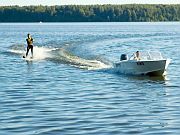- Could Artificial Sweeteners Be Aging the Brain Faster?
- Techniques for Soothing Your Nervous System
- Does the Water in Your House Smell Funny? Here’s Why
- Can a Daily Dose of Apple Cider Vinegar Actually Aid Weight Loss?
- 6 Health Beverages That Can Actually Spike Your Blood Sugar
- Treatment Options for Social Anxiety Disorder
- Understanding the Connection Between Anxiety and Depression
- How Daily Prunes Can Influence Cholesterol and Inflammation
- When to Take B12 for Better Absorption and Energy
- Epsom Salts: Health Benefits and Uses
Safety Tips for Water Skiing and Wake Boarding


Wake boarding and water skiing are great ways to have fun and be physically active during the summer months, but certain safety precautions need to be followed to prevent serious injuries, experts say.
Every year in the United States, thousands of people are hurt in water skiing and wake boarding accidents, according to Nationwide Children’s Hospital, in Columbus, Ohio. Wake boarding is similar to water skiing, but is done on a single board instead of two skis.
Most water skiing injuries involve sprains and strains in the legs. Wake boarders often get cuts and injuries to their head and face. Wake boarding is more likely than water skiing to result in a traumatic brain injury, cautioned experts at Nationwide Children’s.
There are ways water skiers and wake boarders can reduce their risk for injury before they head out to the water, including:
- Learn how to get out of the water and how to use a tow rope safely.
- Review basic hand signals with a spotter.
- Make sure the boat operator is licensed and experienced with both the boat and the body of water.
- Always wear a U.S. Coast Guard approved life jacket.
- Wake boarders should wear an approved safety helmet.
People engaging in water sports should also consider these factors to ensure their safety:
- Water ski and wake board during the day – not at night.
- Never use drugs or alcohol while driving a boat, water skiing or wake boarding.
- Always have a spotter sitting at the back of the boat to watch the skier or wake boarder and communicate with the person driving the boat.
- Let go of the tow rope immediately after a fall.
- Do not climb into a boat from the water unless the propeller is stopped.
- Quit water skiing or wake boarding at the first sign of lighting or thunder.
- Never water ski or wake board in restricted areas.
More information
The California Division of Boating and Waterways provides more information on water sport safety.
Source: HealthDay
Copyright © 2026 HealthDay. All rights reserved.










